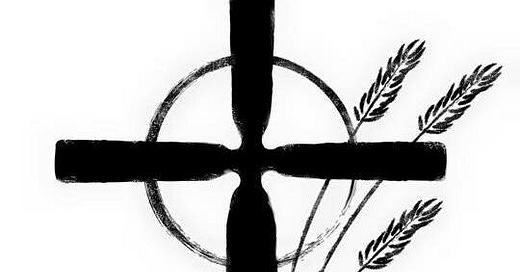There are two Sundays left in this liturgical year. The final Sunday of each liturgical cycle is called The Reign of Christ Sunday and each year at St. Mary’s, we pause the week before the final Sunday to honestly reflect on the spaces in our communities and lives where it is difficult to believe love is reigning over anything in the world. It is a Sunday where we intentionally lament over these places, relationships, and circumstances.
There is a story in the news this morning about Edgar Barrientos-Quintana, a man wrongly accused, convicted, and imprisoned for sixteen years for a murder he didn’t commit. He was released this week when his conviction was overturned. Edgar’s defense had video evidence of his alibi, seven witnesses who confirmed his alibi, and even evidence of attendance at a baptism party the night of the crime he was accused of committing. When pushed on why the authorities ignored the overwhelming evidence of his innocence, they shared it was because a tv show called The First 48 was following their investigation and they had filmed the moment they told the family of the victim they had found the man who killed their family member. Unwillingness to walk back their filmed mistake while performing for a television show cost the man and his family sixteen years of freedom and frivolously re-victimized the family who was already suffering unspeakable loss.
A news anchor asked Edgar what was the one lesson he learned from this experience—a fairly callous question, especially to someone who was imprisoned largely because of the tv news industry—and his answer was, “We need more people like Julie Jonas, and those who work for The Great North Innocence Project, who never gave up on me or my case.” Julie is the lawyer who worked daily to re-member Edgar to his family, to his community, and to the innocence of his life found in the truth. The mission of Julie’s work is to free the wrongfully convicted and prevent future wrongful convictions from occurring. Since 1989 they have been part of 3,423 exonerations and bringing light into 30,250 years of life lost in prison.
How many false stories are we living so deeply embedded within? What is the cost to the freedom of those around us? What is the cost to our own dignity and life? Where might we be numb to what is wrong and blind to what is right? What crack might form that would welcome us into something new, something better? I’m reminded of a lyric from the song This is Your Life, “I don’t have a simple answer, but I know that I can answer…something better.”
Scripture makes the claim that it is those who sit in darkness who will see a great light. Matthew’s gospel insists the little town of Bethlehem refused to be comforted when their sons were killed by the empire while the wicked king felt threatened by the birth of Jesus. Walter Brueggemann writes, in The Prophetic Imagination, “The capacity to feel the hurt of the marginal people means an end to all social arrangements that nullified pain by a remarkable depth of numbness.” He adds, “The kings would do anything but grieve, for that is the ultimate criticism and the decisive announcement of dismantling.”
Our pause to grieve and lament this Sunday is an attempt at reducing the numbness in our lives, feeling the pain of the marginalized, and believing the energy for dismantling the systems of death comes from the simple act of refusing to call them necessary, good, and normal.
Our lament service is the only Sunday of the year we take a break from receiving the Eucharist. There will be moments of silence separated by readings and music. There will also be space for writing laments as well as lighting candles. If you know someone who needs to lament, this is a great Sunday to invite them to join us in these spaces.
And in closing, if you’ll indulge me one more Brueggemann quote, “Clearly only those who anguish will sing new songs. Without anguish the new song is likely to be strident and just more royal fakery.”
Discussion about this post
No posts



